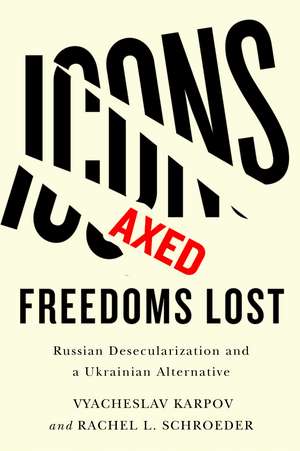Icons Axed, Freedoms Lost: Russian Desecularization and a Ukrainian Alternative
Autor Vyacheslav Karpov, Rachel L. Schroederen Limba Engleză Paperback – 14 ian 2025
Preț: 231.21 lei
Nou
Puncte Express: 347
Preț estimativ în valută:
44.24€ • 47.31$ • 36.89£
44.24€ • 47.31$ • 36.89£
Carte disponibilă
Livrare economică 27 martie-10 aprilie
Livrare express 12-18 martie pentru 28.92 lei
Preluare comenzi: 021 569.72.76
Specificații
ISBN-13: 9781978822221
ISBN-10: 1978822227
Pagini: 298
Ilustrații: 1 table
Dimensiuni: 156 x 235 x 23 mm
Greutate: 0.43 kg
Editura: Rutgers University Press
Colecția Rutgers University Press
ISBN-10: 1978822227
Pagini: 298
Ilustrații: 1 table
Dimensiuni: 156 x 235 x 23 mm
Greutate: 0.43 kg
Editura: Rutgers University Press
Colecția Rutgers University Press
Notă biografică
VYACHESLAV KARPOV is a professor of sociology at Western Michigan University in Kalamazoo, Michigan. He is the coeditor, with Manfred Svensson, of Secularization, Desecularization, and Toleration: Cross-Disciplinary Challenges to a Modern Myth.
RACHEL L. SCHROEDER is an assistant professor of sociology at Eastern Michigan University in Ypsilanti, Michigan.
RACHEL L. SCHROEDER is an assistant professor of sociology at Eastern Michigan University in Ypsilanti, Michigan.
Cuprins
Introduction: Approaching the Puzzle of Russian Desecularization
1 Desecularization and Its Social Dynamics
2 Desecularization as a Social Drama
3 The Unresolved Dramas of the Anomic 1990s
4 “Beware, Religion!”: A Threshold Social Drama of Russian Desecularization
5 Forbidden Art—2006: A Counteroffensive Defeated
6 Mother of God, Chase Putin Away! The Pussy Riot Case and the Making of the Law on Religious Feelings
7 Russia’s Silent Majority and “the Enemies of the Church”
8 The Aftermath: From the Enactment of the Law on Religious Feelings to the Invasion of Ukraine (2013–2023)
9 A Ukrainian Alternative
Conclusion: The Drama and Tragedy of Russian Desecularization
Acknowledgments
Notes
References
Index
1 Desecularization and Its Social Dynamics
2 Desecularization as a Social Drama
3 The Unresolved Dramas of the Anomic 1990s
4 “Beware, Religion!”: A Threshold Social Drama of Russian Desecularization
5 Forbidden Art—2006: A Counteroffensive Defeated
6 Mother of God, Chase Putin Away! The Pussy Riot Case and the Making of the Law on Religious Feelings
7 Russia’s Silent Majority and “the Enemies of the Church”
8 The Aftermath: From the Enactment of the Law on Religious Feelings to the Invasion of Ukraine (2013–2023)
9 A Ukrainian Alternative
Conclusion: The Drama and Tragedy of Russian Desecularization
Acknowledgments
Notes
References
Index
Recenzii
"This book offers an insightful analysis of the political ethos of Orthodoxy in Russia and how it has been shaped by imperial and Soviet legacies. The authors trace the dynamics giving rise to neo-traditionalist and neo-secularist camps in Russia and contrast this with attitudes to religious and secular authorities in Ukraine. The comparison is fruitful and theoretically innovative. This a timely and much-needed study of a powerful undercurrent in Eurasian politics."
"This study beautifully combines an important theoretical achievement with a thoroughly researched, helpful, and penetrating comparison between the desecularization dynamics in Ukraine and Russia. For too long religious studies tended to ignore Ukraine or regard it as a subspecies of Russian culture. Karpov and Schroeder’s study parts ways with this outdated perspective. This timely book can be recommended to every reader who seeks a deeper understanding of the religious background of the current violent clash between two radically different cultural projects—that of Russia and that of Ukraine."
"Contrary to the prediction of many social scientists, religion has remained important in people’s lives and is at the center of many conflicts worldwide. Here Karpov and Schroeder expertly examine a unique case of a desecularizing Russia and the battle between a church that is a pawn of the state and a society that is losing its freedom to the tightening tentacles of religious restrictions. The book convincingly shows why Ukraine—unlike Russia—chose a path towards religious freedom and pluralism. A must read for anyone interested in the complex role of religion in today’s world, especially those trying to make sense of religion, politics, and society in Russia and Ukraine."
"Karpov and Schroeder have written a refreshing account of post-Soviet Russia’s desecularization. What started as a bottom-up process has succeeded only as a top-down, state-controlled, and state-dosed injection of religion into political and public life."
"This study beautifully combines an important theoretical achievement with a thoroughly researched, helpful, and penetrating comparison between the desecularization dynamics in Ukraine and Russia. For too long religious studies tended to ignore Ukraine or regard it as a subspecies of Russian culture. Karpov and Schroeder’s study parts ways with this outdated perspective. This timely book can be recommended to every reader who seeks a deeper understanding of the religious background of the current violent clash between two radically different cultural projects—that of Russia and that of Ukraine."
"Contrary to the prediction of many social scientists, religion has remained important in people’s lives and is at the center of many conflicts worldwide. Here Karpov and Schroeder expertly examine a unique case of a desecularizing Russia and the battle between a church that is a pawn of the state and a society that is losing its freedom to the tightening tentacles of religious restrictions. The book convincingly shows why Ukraine—unlike Russia—chose a path towards religious freedom and pluralism. A must read for anyone interested in the complex role of religion in today’s world, especially those trying to make sense of religion, politics, and society in Russia and Ukraine."
"Karpov and Schroeder have written a refreshing account of post-Soviet Russia’s desecularization. What started as a bottom-up process has succeeded only as a top-down, state-controlled, and state-dosed injection of religion into political and public life."
Descriere
In the years between the Soviet collapse and the Russo-Ukrainian war, Russia went from persecuting believers to jailing irreligionists, while Ukraine solidified religious pluralism and tolerance. The book richly documents and explains the development of this contrast while offering an original theoretical and methodological perspective on desecularization (the resurgence of religion’s societal role).
